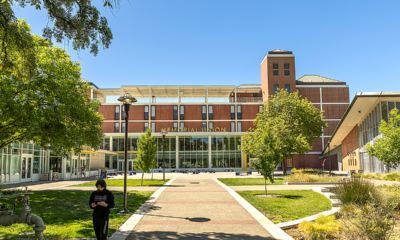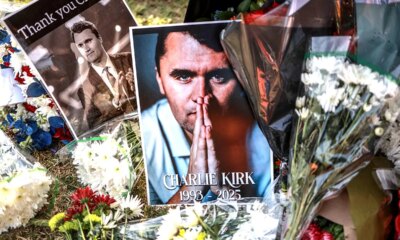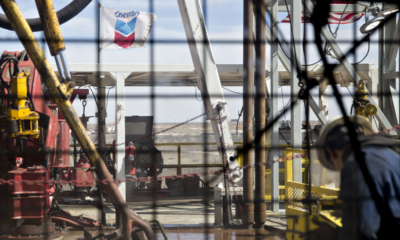- Tariffs impact businesses in Rye Canyon differently
- Supreme Court may rule on Trump’s emergency tariffs soon
- Some businesses adapt, others struggle with tariff costs
California
California hospital told woman's family she had checked out when she was actually dead, lawsuit says

Northern California hospital officials told a 31-year-old woman’s family that she had checked out — when the patient had actually died and her body kept in cold storage for a year, loved ones said in a civil lawsuit.
Jessie Marie Peterson had been suffering from Type 1 diabetes when she was admitted to Mercy San Juan Medical Center on April 6 last year, according to allegations made in a Sacramento County Superior Court lawsuit filed earlier this month by the patient’s family.
Days after she was admitted, Peterson’s mother Ginger Congi called Mercy San Juan to check on her daughter was told the patient had been discharged, according to the complaint.
The family filed a missing person’s report with the county sheriff’s department, posted notices around town and even interviewed local homeless people in hopes someone had seen Peterson.
“The family searched and searched for Jessie. It was not until April 12, 2024, that the Sacramento County Detective’s Office notified Jessie’s family that she was found deceased at Mercy San Juan hospital,” according to the lawsuit filed by the plaintiffs’ attorney Marc Greenberg.
“At this point, Jessie’s body was so decomposed that an open casket funeral was not feasible, and Jessie’s fingerprints were not even obtainable for any keepsake.”
The decomposition also made it impossible for an autopsy to determine “whether medical malpractice played any role” in Peterson’s death, the lawsuit said.
The family eventually found out Peterson died on April 8 last year, but it took until April 4 of this year for a death certificate to be signed by Dr. Nadeem Mukhtar.
For almost all this time, Peterson’s body had been kept shelf No. Red 22A in an off-site cold storage unit, according to hospital records obtained by the family.
The family is asking for $25 million for the hospital’s alleged negligence.
A representative for Dignity Health, the corporate umbrella for the hospital, could not be immediately reached for comment on Thursday.
“Mercy San Juan hospital advertises that ‘at our care facilities, we take pride in treating all people with dignity and respect.’ In this case, there was no dignity and no respect,” Greenberg said.
“Mercy San Juan hospital failed in its most fundamental duty to notify Jessie’s family of her death. Mercy San Juan stored Jessie in an off-site warehouse and she was left to decompose for nearly a year while her family relentlessly inquired about her whereabouts.”

Continue Reading
California
Gavin Newsom proposes $350B California budget — kicks the can on debt

California Gov. Gavin Newsom unveiled a record-high $350 billion state budget Friday that makes “historic” investments in areas like education — but kicks the can on paying down federal debt, foisting costs onto struggling employers.
Newsom’s budget incorporates a $43 billion windfall tied to the stock market that he touted in his State of the State speech Thursday, bringing his office’s estimated deficit down to $3 billion — the state’s fourth deficit in a row. The budget plows billions into maintaining education, health care, and other programs but ignores a $20 billion federal loan for Covid unemployment payments — a situation one legislator called “alarming.”
Ignoring the loan means small businesses are on the hook for the state’s debt, said state Sen. Roger Niello of Fair Oaks.
“We already have the highest unemployment in the nation and we’re putting this additional burden on our employers. It makes absolutely no sense,” Niello said.
The budget includes $662.2 million in mandatory interest payments, but there is no money going towards the principal.
Since July, the total balance has ballooned to $21.3 billion, and private employers in California pick up the tab under federal rules. Employers pay an $42 extra per employee this year and growing, per KCRA
Every state expect California has paid off the Covid-era loans.
“That is an alarming thing because [Newsom is] basically saying that businesses and employment are not a priority to him and that’s troubling,” Niello added.
At 5.5%, California’s unemployment rate was the highest in the country as of November.
Newsom’s $350 billion budget proposal is about $30 billion higher than this year’s budget, thanks largely to federal healthcare cuts that forced costs onto the state and mandatory set-asides in areas like education.
At a budget briefing Friday, Newsom’s finance director Joe Stephenshaw highlighted record spending on education— amounting to a record $27,418 per K-12 student, $5.3 billion for the University of California system, $15.4 billion to community colleges, and $1 billion to needy schools — along with $500 million towards local homelessness prevention, $195 million in new public safety spending, $3 billion for the state’s rainy day fund and $4 billion for school reserve funds.
The budget includes some cuts to climate-related spending and housing and homelessness, per Calmatters. And it does not include any direct funding for Prop. 36, the anti-crime measure supported by nearly 70% of voters in 2024 — a move Republicans blasted.
But even with Newsom’s unexpected windfall, analysts expect deficits to grow to as high as $35 billion in the coming years as expenditures outpace even optimistic revenue projections.
Newsom and the state Legislative Analyst create separate budget projections, and the governor’s has historically been far rosier on the revenue side. The legislative analyst projected a $18 billion deficit in the coming fiscal year, while the governor calculated $3 billion.
Under Newsom, the state’s general fund spending has increased by 77% partly owing to new programs spun up when the state was flush with cash, according to Republican legislators.
Newsom’s $350 billion budget — the last before he leaves office next year — does little to confront ballooning expenses, dumping the problem on the future governor and Legislature, according to Senate Minority Leader Brian Jones.
“This is more of the same from a lame-duck governor content on leaving the rest of us to pick up the financial pieces when he leaves office,” Jones said in a statement.
Democrats in the legislature were more measured in their responses.
“During these times of uncertainty, we must craft a responsible budget that prioritizes the safety and fiscal stability of California families,” said State Senate Leader Monique Limón in a statement.
Newsom and legislators will refine the budget in the coming months towards a final proposal in May.
One major unknown is how California will handle a loss of about $1.4 billion in funding due toTrump administration changes to low-income health care and food programs.
Last year, Newsom was force to scale back a controversial plan to provide Medicaid coverage for illegal immigrants after costs spiked, forcing California was forced to borrow $3.4 billion, Politico reported.
Newsom’s budget didn’t fully explain what would happen to immigrant health care under federal cuts, and Stephenshaw struggled to answer detailed questions from reporters — saying Newsom’s office was still awaiting guidance from the feds.
“As we work through the May revision, this is something we’ll be well aware of and we’ll make those decision at that time,” he said.
California
How Trump’s tariffs ricochet through a Southern California business park

VALENCIA, California, Jan 9 (Reuters) – America’s trade wars forced Robert Luna to hike prices on the rustic wooden Mexican furniture he sells from a crowded warehouse here, while down the street, Eddie Cole scrambled to design new products to make up for lost sales on his Chinese-made motorcycle accessories.
Farther down the block, Luis Ruiz curbed plans to add two imported molding machines to his small plastics factory.
Sign up here.
“I voted for him,” said Ruiz, CEO of Valencia Plastics, referring to President Donald Trump. “But I didn’t vote for this.”
All three businesses are nestled in the epitome of a globalized American economy: A lushly landscaped California business park called Rye Canyon. Tariffs are a hot topic here – but experiences vary as much as the businesses that fill the 3.1 million square feet of offices, warehouses, and factories.
Tenants include a company that provides specially equipped cars to film crews for movies and commercials, a dance school, and a company that sells Chinese-made LED lights. There’s even a Walmart Supercenter. Some have lost business while others have flourished under the tariff regime.
Rye Canyon is roughly an hour-and-a-half drive from the sprawling Ports of Los Angeles and Long Beach. And until now, it was a prime locale for globally connected businesses like these. But these days, sitting on the frontlines of global trade is precarious.
The average effective tariff rate on imports to the U.S. now stands at almost 17%–up from 2.5% before Trump took office and the highest level since 1935. Few countries have been spared from the onslaught, such as Cuba, but mainly because existing barriers make meaningful trade with them unlikely.
White House spokesman Kush Desai said President Trump was leveling the playing field for large and small businesses by addressing unfair trading practices through tariffs and reducing cumbersome regulations.
‘WE HAD TO GET CREATIVE’ TO OFFSET TRUMP’S TARIFFS
Rye Canyon’s tenants may receive some clarity soon. The U.S. Supreme Court could rule as early as Friday on the constitutionality of President Trump’s emergency tariffs. The U.S. has so far taken in nearly $150 billion under the International Emergency Economic Powers Act. If struck down, the administration may be forced to refund all or part of that to importers.
For some, the impact of tariffs was painful – but mercifully short. Harlan Kirschner, who imports about 30% of the beauty products he distributes to salons and retailers from an office here, said prices spiked during the first months of the Trump administration’s push to levy the taxes.
“It’s now baked into the cake,” he said. “The price increases went through when the tariffs were being done.” No one talks about those price increases any more, he said.
For Ruiz, the plastics manufacturer, the impact of tariffs is more drawn out. Valencia makes large-mouth containers for protein powders sold at health food stores across the U.S. and Canada. Before Trump’s trade war, Ruiz planned to add two machines costing over half a million dollars to allow him to churn out more containers and new sizes.
But the machines are made in China and tariffs suddenly made them unaffordable. He’s spent the last few months negotiating with the Chinese machine maker—settling on a plan that offsets the added tariff cost by substituting smaller machines and a discount based on his willingness to let the Chinese producer use his factory as an occasional showcase for their products.
“We had to get creative,” he said. “We can’t wait for (Trump) to leave. I’m not going to let the guy decide how we’re going to grow.”
‘I’M MAD AT HIM NOW’
To be sure, there are winners in these trade battles. Ruiz’s former next-door neighbor, Greg Waugh, said tariffs are helping his small padlock factory. He was already planning to move before the trade war erupted, as Rye Canyon wanted his space for the expansion of another larger tenant, a backlot repair shop for Universal Studios. But he’s now glad he moved into a much larger space about two miles away outside the park, because as his competitors announced price increases on imported locks, he’s started getting more inquiries from U.S. buyers looking to buy domestic.
“I think tariffs give us a cushion we need to finally grow and compete,” said Waugh, president and CEO of Pacific Lock.
For Cole, a former pro motorcycle racer turned entrepreneur, there have only been downsides to the new taxes.
He started his motorcycle accessories company in his garage in 1976 and built a factory in the area in the early 1980s. He later sold that business and – as many industries shifted to cheaper production from Asia – reestablished himself later as an importer of motorcycle gear with Chinese business partners, with an office and warehouse in Rye Canyon.
“Ninety-five percent of our products come from China,” he said. Cole estimates he’s paid “hundreds of thousands” in tariffs so far. He declined to disclose his sales.
Cole said he voted for Trump three times in a row, “but I’m mad at him now.”
Cole even wrote to the White House, asking for more consideration of how tariffs disrupt small businesses. He included a photo of a motorcycle stand the company had made for Eric Trump’s family, which has an interest in motorcycles.
“I said, ‘Look Donald, I’m sure there’s a lot of reasons you think tariffs are good for America,” but as a small business owner he doesn’t have the ability to suddenly shift production around the world to contain costs like big corporations. He’s created new products, such as branded tents, to make up for some of the business he’s lost in his traditional lines as prices spiked.
He pulls out his phone to show the response he got back from the White House, via email. “It’s a form letter,” he said, noting that it talks about how the taxes make sense.
Meanwhile, Robert Luna isn’t waiting to see if tariffs will go away or be refunded. His company, DeMejico, started by his Mexican immigrant parents, makes traditional-style furniture including hefty dining tables that sell for up to $8,000. He’s paying 25% tariffs on wooden furniture and 50% on steel accents like hinges, made in his own plant in Mexico. He’s raised prices on some items by 20%.
Fearing further price hikes from tariffs and other rising costs will continue to curb demand, he’s working with a Vietnamese producer on a new line of inexpensive furniture he can sell under a different brand name. Vietnam has tariffs, he said, but also a much lower cost base.
“My thing is mere survival,” he said, “that’s the goal.”
Reporting by Timothy Aeppel; additional reporting by David Lawder
Editing by Anna Driver and Dan Burns
Our Standards: The Thomson Reuters Trust Principles.
California
Up to 20 billionaires may leave California over tax threat | Fox Business Video

California Congressman Darrell Issa discusses reports that as many as 20 billionaires could leave the state amid concerns over a proposed new wealth tax which critics say is driving high-net-worth taxpayers out of California on ‘The Evening Edit.’
-

 Detroit, MI7 days ago
Detroit, MI7 days ago2 hospitalized after shooting on Lodge Freeway in Detroit
-

 Technology4 days ago
Technology4 days agoPower bank feature creep is out of control
-

 Dallas, TX5 days ago
Dallas, TX5 days agoDefensive coordinator candidates who could improve Cowboys’ brutal secondary in 2026
-

 Dallas, TX2 days ago
Dallas, TX2 days agoAnti-ICE protest outside Dallas City Hall follows deadly shooting in Minneapolis
-

 Iowa4 days ago
Iowa4 days agoPat McAfee praises Audi Crooks, plays hype song for Iowa State star
-

 Health6 days ago
Health6 days agoViral New Year reset routine is helping people adopt healthier habits
-

 Nebraska3 days ago
Nebraska3 days agoOregon State LB transfer Dexter Foster commits to Nebraska
-

 Delaware1 day ago
Delaware1 day agoMERR responds to dead humpback whale washed up near Bethany Beach















